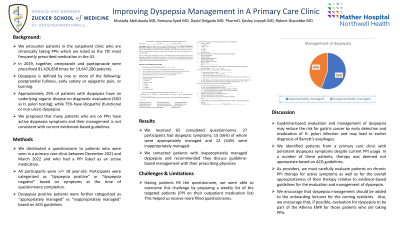Back


Poster Session C - Monday Afternoon
Category: Stomach
C0682 - Improving Dyspepsia Management in a Primary Care Clinic
Monday, October 24, 2022
3:00 PM – 5:00 PM ET
Location: Crown Ballroom

Has Audio

Mustafa Abdulsada, MD
Mather Hospital
Port Jefferson, NY
Presenting Author(s)
Mustafa Abdulsada, MD1, Kesley Joseph, MD1, David Delgado, MD1, Romana Syed, MD1, Robert Giacobbe, DO2
1Mather Hospital, Port Jefferson, NY; 2Mather Hospital/Northwell Health, Port Jefferson, NY
Introduction: We encounter patients in the outpatient clinic who are chronically taking PPIs which are listed as the 7th most frequently prescribed medication in the US . In 2019, together, omeprazole and pantoprazole were prescribed 81,426,858 times for 19,647,280 patients. Dyspepsia is defined by one or more of the following: postprandial fullness, early satiety or epigastric pain, or burning. Approximately 25% of patients with dyspepsia have an underlying organic disease on diagnostic evaluation (EGD vs H. pylori testing), while 75% have idiopathic (functional or non-ulcer) dyspepsia. We proposed that many patients who are on PPIs have active dyspepsia symptoms and are not being managed consistent with current evidenced-based guidelines.
Methods: We distributed a questionnaire to patients who were seen in a primary care clinic between December 2021 and March 2022 and who had a PPI listed as an active medication. All participants were age 18 or older. Participants were categorized as “dyspepsia positive” or “dyspepsia negative” based on symptoms at the time of questionnaire completion. Dyspepsia positive patients were further categorized as “appropriately managed” vs “inappropriately managed” based on ACG guidelines.
Results: We received 65 completed questionnaires. 27 participants had dyspeptic symptoms of whom 15 (56%) were appropriately managed and 12 (44%) were inappropriately managed. We contacted patients with inappropriately managed dyspepsia and recommended they discuss guideline-based management with their prescribing physician.
Discussion: Guideline-based evaluation and management of dyspepsia may reduce the risk for gastric cancer by early detection and eradication of H. pylori infection and may lead to earlier diagnosis of Barrett’s esophagus. We identified patients from a primary care clinic with persistent dyspepsia symptoms despite current PPI usage. In a number of these patients, therapy was deemed not appropriate based on ACG guidelines. As providers, we must carefully evaluate patients on chronic PPI therapy for active symptoms as well as for the overall appropriateness of their therapy relative to evidence-based guidelines for the evaluation and management of dyspepsia.
Disclosures:
Mustafa Abdulsada, MD1, Kesley Joseph, MD1, David Delgado, MD1, Romana Syed, MD1, Robert Giacobbe, DO2. C0682 - Improving Dyspepsia Management in a Primary Care Clinic, ACG 2022 Annual Scientific Meeting Abstracts. Charlotte, NC: American College of Gastroenterology.
1Mather Hospital, Port Jefferson, NY; 2Mather Hospital/Northwell Health, Port Jefferson, NY
Introduction: We encounter patients in the outpatient clinic who are chronically taking PPIs which are listed as the 7th most frequently prescribed medication in the US . In 2019, together, omeprazole and pantoprazole were prescribed 81,426,858 times for 19,647,280 patients. Dyspepsia is defined by one or more of the following: postprandial fullness, early satiety or epigastric pain, or burning. Approximately 25% of patients with dyspepsia have an underlying organic disease on diagnostic evaluation (EGD vs H. pylori testing), while 75% have idiopathic (functional or non-ulcer) dyspepsia. We proposed that many patients who are on PPIs have active dyspepsia symptoms and are not being managed consistent with current evidenced-based guidelines.
Methods: We distributed a questionnaire to patients who were seen in a primary care clinic between December 2021 and March 2022 and who had a PPI listed as an active medication. All participants were age 18 or older. Participants were categorized as “dyspepsia positive” or “dyspepsia negative” based on symptoms at the time of questionnaire completion. Dyspepsia positive patients were further categorized as “appropriately managed” vs “inappropriately managed” based on ACG guidelines.
Results: We received 65 completed questionnaires. 27 participants had dyspeptic symptoms of whom 15 (56%) were appropriately managed and 12 (44%) were inappropriately managed. We contacted patients with inappropriately managed dyspepsia and recommended they discuss guideline-based management with their prescribing physician.
Discussion: Guideline-based evaluation and management of dyspepsia may reduce the risk for gastric cancer by early detection and eradication of H. pylori infection and may lead to earlier diagnosis of Barrett’s esophagus. We identified patients from a primary care clinic with persistent dyspepsia symptoms despite current PPI usage. In a number of these patients, therapy was deemed not appropriate based on ACG guidelines. As providers, we must carefully evaluate patients on chronic PPI therapy for active symptoms as well as for the overall appropriateness of their therapy relative to evidence-based guidelines for the evaluation and management of dyspepsia.
Disclosures:
Mustafa Abdulsada indicated no relevant financial relationships.
Kesley Joseph indicated no relevant financial relationships.
David Delgado indicated no relevant financial relationships.
Romana Syed indicated no relevant financial relationships.
Robert Giacobbe indicated no relevant financial relationships.
Mustafa Abdulsada, MD1, Kesley Joseph, MD1, David Delgado, MD1, Romana Syed, MD1, Robert Giacobbe, DO2. C0682 - Improving Dyspepsia Management in a Primary Care Clinic, ACG 2022 Annual Scientific Meeting Abstracts. Charlotte, NC: American College of Gastroenterology.
